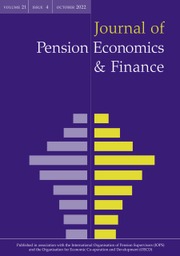Article contents
Spousal and survivor benefits in option value models of retirement: an application to Belgium
Published online by Cambridge University Press: 30 August 2017
Abstract
We study retirement incentives with an augmented reduced form option value model à la Stock and Wise (1990). We propose methodological extensions to better reflect the respective incentives faced by singles and couples. Our results show that a more comprehensive modeling of couples’ incentives leads to very different patterns of retirement incentives – particularly for women. We apply the new indicators to data from the Survey of Health, Ageing and retirement in Europe in Belgium and find two key results. First, contrary to several previous studies, we obtain a positive signed income effects. Second, we find very different retirement incentives for men and women, with little flexibility in the retirement decision for men and substantially more flexibility for women as a function of financial incentive and household composition.
Information
- Type
- Article
- Information
- Copyright
- Copyright © Cambridge University Press 2017
Footnotes
The authors acknowledge financial support from the Belspo project EMPOV (TA/00/45). This paper uses data from the European Union Labour Force Survey (Eurostat, European Union). Eurostat has no responsibility for the results and conclusions which are the authors’ only. It also uses data from SHARE Waves 1 and 2 release 2.6.0, as of 29 November 2013 (DOI: 10.6103/SHARE.w1.260 and 10.6103/SHARE.w2.260) and SHARELIFE release 1.0.0, as of 24 November 2010 (DOI: 10.6103/SHARE.w3.100). The SHARE data collection has been primarily funded by the European Commission through the 5th Framework Programme (project QLK6-CT-2001-00360 in the thematic programme Quality of Life), through the 6th Framework Programme (projects SHARE-I3, RII-CT-2006-062193, COMPARE, CIT5-CT-2005-028857, and SHARELIFE, CIT4-CT-2006-028812) and through the 7th Framework Programme (SHARE-PREP, N° 211909, SHARE-LEAP, N° 227822 and SHARE M4, N° 261982). Additional funding from the US National Institute on Aging (U01 AG09740-13S2, P01 AG005842, P01 AG08291, P30 AG12815, R21 AG025169, Y1-AG-4553-01, IAG BSR06-11 and OGHA 04-064) and the German Ministry of Education and Research as well as from various national sources is gratefully acknowledged (see www.share-project.org for a full list of funding institutions). Comments welcome at ajousten@ulg.ac.be.
References
- 4
- Cited by

